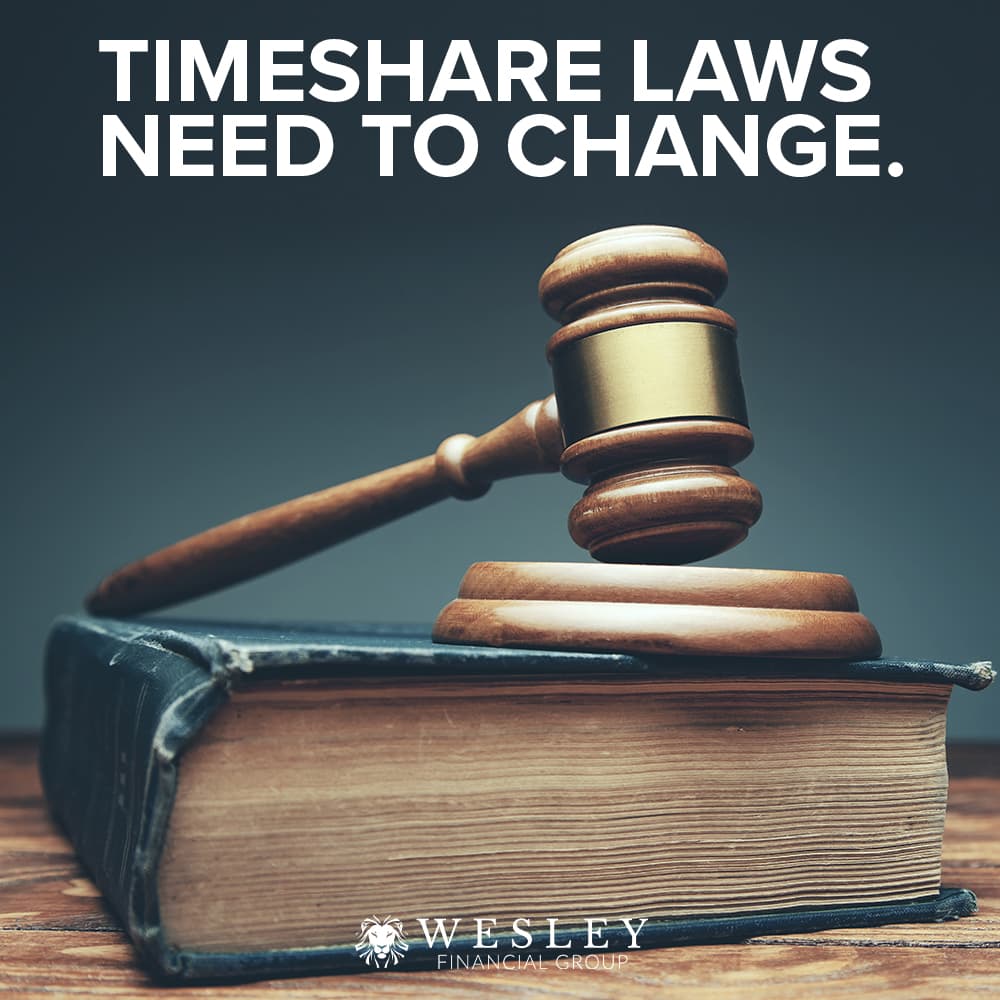Table of Contents
How Much Does It Cost to Get Out of a Timeshare
Canceling a timeshare is expensive. However, there are many reasons why getting rid of your timeshare is a wise choice. Although one problem of timeshare cancellation is the cost, many timeshare companies offer deed-back programs, which are often free or come at a small price.
Timeshare cancellation is one of those circumstances where it’s the best possible option, but it’s plagued with false advertising, empty promises, scams, and fraud. There are many ways to cancel a timeshare, but which case is the best opportunity for you? How do you avoid excessive costs and fraud?
Please continue reading below, where we’ll discuss everything you need to know about the costs of the timeshare cancellation process.
FREE
Timeshare Exit Info Kit
Get your free Timeshare Exit Info Kit today to learn more about Wesley Financial Group and how we may be able to help you get out of your timeshare.
Timeshare Exit Info Kit
Get your free Timeshare Exit Info Kit today to learn more about Wesley Financial Group and how we have saved 50,000 families over $635 million in timeshare debt.
What Is Timeshare Cancellation?
Timeshare cancellation typically involves a timeshare exit team negotiating with your resort company to remove you from the vacation property agreement. Cancellation is needed when timeshare owners miss their purchase’s rescission period. Now, negotiations may be necessary to terminate a timeshare agreement instead of simply writing a cancellation letter. With timeshare cancellation being a relatively new business industry, having an option like an exit program is a powerful help for distressed consumers.
It’s important not to confuse timeshare cancellation companies with timeshare resale companies. The Federal Trade Commission warns owners to steer clear of timeshare scams. Avoid companies asking you to pay upfront fees simply to list your timeshare for sale in the secondary market. Sadly, they’re possibly trying to take advantage of you.
Legal timeshare cancellation also comes at a cost, but you get the assurance of professional assistance. How much does it cost? That isn’t easy to answer as it varies due to the exit strategy you need. Furthermore, the associated fees differ from client to client.
Pros And Cons of Timeshare Cancellation
Timeshare cancellation offers financial relief and peace of mind by freeing you from ongoing fees and stressful obligations. However, it requires careful consideration of upfront costs and potential legal implications to ensure a smooth and beneficial exit process.
PROS
- Financial Relief: Canceling your property can free you from ongoing timeshare maintenance fees and special assessments, saving you significant amounts of money over time.
- Peace of Mind: Eliminating the burden of a timeshare can reduce stress and improve your financial situation.
- Avoiding Deceptive Practices: Many timeshare owners feel misled by sales tactics. Cancellation can provide an escape from these deceptive practices.
- Flexibility: Once free from a timeshare, you can plan vacations with more flexibility and without being tied to specific dates and locations.
CONS
- Upfront Costs: The process of canceling a timeshare can involve upfront fees. However, these costs can be significantly lower than the long-term expenses of maintaining a timeshare.
- Time-Consuming Process: While the cancellation process can take several months, professional assistance can streamline the process and handle the complexities for you.
- Potential Legal and Credit Implications: There may be legal fees involved, and improper handling could impact your credit score.
- Vetting Cancellation Companies: The industry includes some fraudulent companies, making it crucial to choose a reputable timeshare cancellation company with a proven track record of successful exits.
Reasons Why You Should Cancel Your Timeshare
Most timeshare owners eventually get to the point where they decide to cancel their timeshare. Here are some of the most common reasons:
- Financial Motives: Many cancellations are due to the financial strain of timeshare obligations. Properties’ maintenance and special assessment fees regularly increase, causing financial distress for many timeshare owners.
- Family Arrangements: Timeshares often get purchased for family trips. However, family situations frequently change. Whether it’s a move, a divorce, or a family member passing away, a change in a family can make timeshare ownership less ideal.
- Traveling Restrictions: Timeshares are typically perpetual, meaning they are life-long agreements. Well, eventually, people tend to stop traveling. At this point, a timeshare becomes burdensome.
- Limited Timeshare Scheduling: A common complaint from timeshare owners is the lack of availability at resorts. Nobody wants to deal with scheduling restrictions after paying thousands of dollars for their property.
- Deceptive Sales Tactics: Many timeshare buyers claim salespeople misled them when purchasing their timeshare. The timeshare industry has become notorious for its deceptive sales tactics.
Timeshare Cancellation Fees
Before you cancel your timeshare agreement, you need to understand the fees associated with a cancellation. Understanding these fees will help you negotiate with timeshare cancellation companies.
- Cancellation Fees: Timeshare cancellation fees go directly to the timeshare cancellation company. These fees vary based on your situation.
- Transfer Fees: If you choose the non-attorney-backed process for your timeshare cancellation, transfer fees are necessary for the real estate brokers of your title transfer. These fees go directly to the timeshare developer and are considered processing fees to complete your title transfer.
- Settlement Fees: Not always required, but sometimes settlement fees are required for a timeshare cancellation. Typically, these additional fees only occur if you’re behind on your timeshare payments and the resorts want to recoup some of your missing costs.
The Costs of Buying into a Timeshare
Many disgruntled timeshare owners question why it is so expensive to exit. In short, timeshares come at a high price. According to the American Resort Development Association (ARDA), the average per weekly interval sales price for timeshares is $22,942. Many buyers have to take out a mortgage even to afford it at that price.
On top of the upfront costs and mortgage payments, timeshare owners are also responsible for annual maintenance fees. ARDA reports that the average cost for these fees is $1,000 but largely depends on the unit size. Just as the sales price of timeshares trends upward, so does maintenance, as these fees increase by nearly five percent each year. While timeshares may get marketed as a one-time purchase, some owners find the payments never-ending.
Cost of Timeshare Maintenance Fees
The annual maintenance fee is an average of $1,000. The surprise comes when you learn that the prices increase yearly, often much faster than the general inflation rate. According to the most recent figures, the increase averages around 2% per year. In other words, your initial $1,000 fee could be nearly $1,220 by year 10—a total increase of around 18%.
Whether you use the property or not, you must pay maintenance fees yearly. They are unchangeable. Examine your agreement carefully to see what information is provided about your maintenance fees.
How Much Does It Cost to Get Out of a Timeshare Contract?
The cost of canceling a timeshare will vary depending on the terms of the contract and the individual situation. In some cases, canceling a timeshare is less expensive than keeping the timeshare and continuing to pay the resort developer’s mortgage costs and maintenance fees for years to come.
If you want to cancel your timeshare, the first step is to read the contract thoroughly and understand the terms and conditions of the agreement. Many timeshares include a clause that outlines the costs associated with canceling.
Why Does Timeshare Cancellation Cost Vary?
The cost of getting out of a timeshare can vary greatly depending on the type of contract and the timeshare company you are dealing with.
Nobody’s timeshare purchase agreement is the same. Therefore, the average cost for cancellation varies considerably for each owner. The total expense comes down to your unique situation. Here are questions regularly asked by timeshare exit companies that help determine a person’s cancellation cost:
- Which timeshare developers sold it to you?
- How long have you owned the timeshare?
- Have you paid off the timeshare property in full?
- If not, how much of your timeshare mortgage loan remains?
- Also, how much is your annual maintenance fee?
- Are you behind on any of these monthly payments? Facing a collection agency or a timeshare foreclosure?
- Are there stipulations regarding cancellation in your timeshare agreement?
- What timeshare exit method do you choose?

The Two Most Productive Timeshare Cancellation Methods
Now that you know what a timeshare exit is and understand different exit methods, let’s look at the most effective cancellation options. We have two distinct styles for timeshare cancellation: the attorney-backed and non-attorney-backed processes.
Timeshare Lawyer
If your timeshare mortgage payments are unpaid or you are behind on your timeshare maintenance fee payments, you may have to go this route. The attorney-backed process includes a timeshare cancellation company that works directly with a timeshare attorney. The attorney negotiates with the timeshare resort developer on your behalf to cancel your agreement. In an ideal situation, this process takes several months to complete. However, sometimes it can take several years.
How Much Do Lawyers Charge to Get Out of a Timeshare?
Generally, lawyers charge between $4,000 and $15,000 to represent regretful timeshare owners looking to get out. It can take attorneys a few months to a couple of years to cancel the timeshare agreement outright. Not everyone’s timeshare situation is the same; therefore, the costs for an attorney-backed exit can vary.
Non-Lawyer Backed Timeshare Cancellation
Rather than using a timeshare attorney, this process involves a timeshare cancellation company. The company negotiates directly with the timeshare developer for a real estate title transfer to remove you from the original property agreement. The timeline for this process is typically quicker than the attorney-backed process, but it may come with additional fees.
Timeshare Exit Frequently Asked Questions
Are There Any Penalties for Canceling My Timeshare?
Yes, there are potential penalties for canceling your timeshare. Depending on the terms of your agreement and the laws of your state, you may be subject to financial liabilities, such as fees, fines, or other costs. In other cases, some people experience a credit score dip.
In some cases, you may be required to pay a cancellation fee. This fee is typically a percentage of the total purchase price of the timeshare and is intended to compensate the developer for the costs associated with the sale.
How Much Will I Receive If I Sell My Timeshare?
The amount of money you will receive for selling your timeshare will depend on various factors.
First, the market value of your timeshare will determine how much you can expect to receive. This value is based on the size of the timeshare, its location, and the amenities it offers. If your timeshare is located in a desirable area and offers desirable amenities, you can expect to receive more money. However, timeshares are not profitable investments. Although it may be possible to refund some money when selling a timeshare, it inevitably is sold to a buyer at a loss. Let it be known there is no “money-back guarantee” with timeshares.
Can I Rent Out My Timeshare?
Yes, you can rent out your timeshare. However, it is essential to understand that renting out your timeshare can be complicated and may require research and effort.
You need to determine if your timeshare is eligible for rental. Some timeshares do not qualify for rental, so you should check with your timeshare company or resort to see if yours is eligible.
Final Thoughts
How much does it cost to cancel an unwanted timeshare? It’s tough to say. Still, a lot of time and money can be saved by cancellation. The best way to cancel is through a trustworthy timeshare exit company with a history of successful cancellations. Wesley Financial Group, LLC is an excellent example of the timeshare exit industry.
They’ve been terminating timeshare agreements for over ten years. Reach out to their cancellation experts today to learn more!
Unsure if cancellation is the right choice? Explore this timeshare cancellation hub for more information.

Over 50,000 families helped!
Find out if you can cancel your timeshare. Schedule a FREE consultation with timeshare cancellation experts now.
Get Rid of Your Timeshare
Schedule a FREE Consultation with one of our timeshare cancellation experts who have saved families over $635 million.










